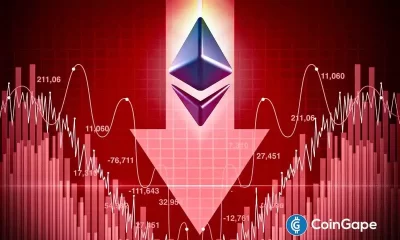Kraken
Kraken to close NFT marketplace by February 2025
Published
5 months agoon
By
admin

Kraken has announced the shutdown of its NFT marketplace to redirect resources toward new initiatives.
The marketplace will transition into withdrawal-only mode on November 27, 2024, and fully cease operations on February 27, 2025, according to an email from Kraken seen by crypto.news.
Kraken explained that the closure will allow the company to focus on undisclosed “new products and services.” Users are urged to withdraw their NFTs to self-custodial wallets or Kraken Wallets before the February deadline.
Kraken’s support team will assist users in the transition.
The downfall of NFTs
NFTs, or nonfungible tokens, are unique blockchain assets that verify ownership of digital or physical items. While they gained popularity during the crypto boom, the market has struggled to recover since the 2022 bear market.
Kraken’s NFT marketplace, launched in beta in November 2022, aimed to tap into the growing interest in NFTs at the time. However, market conditions and shifting priorities have led to the decision to wind down operations.
Source link
You may like


Dogecoin Follows This Blueprint, Says Crypto Analyst


Metaplanet Buys Additional ¥3.8 Billion Worth Of Bitcoin


Crypto Trader Unveils Massive Bitcoin Price Target Amid Extended BTC Bull Market – Here’s His Outlook


Is it possible to make $1m with crypto?


Japan’s Metaplanet Buys Another $26M in Bitcoin Amid Tariff Market Uncertainty


Has Ethereum Price Bottomed? 3 Reason Why ETH Could Crash More
Altcoins
Helium (HNT) Jumps After SEC Dismisses Lawsuit Against Team Behind the Decentralized Wireless Network
Published
1 day agoon
April 13, 2025By
admin
A Solana (SOL)-based decentralized wireless network crypto project is skyrocketing after the U.S. Securities and Exchange Commission (SEC) dismissed its lawsuit against the protocol.
In a new thread on the social media platform X, the development team behind Helium (HNT) says that the regulatory agency has dropped its lawsuit against the crypto platform, which alleged that they violated securities laws.
According to a press release, Helium developer Nova Labs agreed to pay the SEC $200,000 to settle the accusation without admitting to any wrongdoing.
News of the dismissal caused HNT to rally as it went from a low of $2.62 on April 10th to a peak of $3.03 just a day later. It has since retraced and is trading for $2.96, a 9.9% increase during the last 24 hours.
The SEC, which originally filed the lawsuit in January, had accused Nova Labs of distributing unregistered securities.
“The SEC has agreed to dismiss its unregistered securities claims with prejudice. Helium Hotspots and the distribution of HNT, MOBILE, and IOT through the Helium Network are not securities. It also means that the SEC cannot bring these charges against Helium again.”
In a recent blog post, Helium says the dismissal of the case is a “landmark outcome” for the digital assets industry and DePIN (Decentralized Physical Infrastructure Networks) technology, which tokenizes real-world infrastructure.
“This landmark outcome is a pivotal turning point for the Helium community and the entire crypto industry, removing legal uncertainty for DePIN projects that use crypto incentives to build real-world infrastructure.
With the dismissal of the SEC’s unregistered securities claims with prejudice, the outcome establishes that selling hardware and distributing tokens for network growth does not automatically make them securities in the eyes of the SEC.”
This marks another lawsuit dropped by the SEC against crypto giants this year after President Donald Trump took office. Other dissolved cases include ones against the crypto exchanges Kraken and Coinbase, retail trading giant Robinhood, non-fungible token (NFT) marketplace OpenSea, and crypto wallet developer MetaMask.
Follow us on X, Facebook and Telegram
Don’t Miss a Beat – Subscribe to get email alerts delivered directly to your inbox
Check Price Action
Surf The Daily Hodl Mix
 

Disclaimer: Opinions expressed at The Daily Hodl are not investment advice. Investors should do their due diligence before making any high-risk investments in Bitcoin, cryptocurrency or digital assets. Please be advised that your transfers and trades are at your own risk, and any losses you may incur are your responsibility. The Daily Hodl does not recommend the buying or selling of any cryptocurrencies or digital assets, nor is The Daily Hodl an investment advisor. Please note that The Daily Hodl participates in affiliate marketing.
Generated Image: Midjourney
Source link
Bitcoin
Kraken Partners With Mastercard To Bring Bitcoin Payments To Over 150 Million Merchants
Published
5 days agoon
April 9, 2025By
admin
Mastercard has announced a landmark partnership with Kraken to enable real-world Bitcoin and crypto payments at scale across the UK and Europe. The collaboration aims to allow Kraken’s users to spend their digital assets at over 150 million merchants worldwide that accept Mastercard, marking a major step forward in the integration of Bitcoin into everyday commerce.
“Mastercard is committed to driving innovation and expanding the possibilities of digital payments,” stated Scott Abrahams, Executive Vice President of Global Partnerships at Mastercard. “Our partnership with Kraken is a concrete demonstration of this, as we work together to unlock the true potential of cryptoassets for everyday use. With a shared ambition to simplify, interoperate, and secure the digital asset ecosystem, we are proud to collaborate with Kraken and bring real value to their user base.”
Kraken, one of the most established cryptocurrency exchanges with over 15 million customers globally, is using Mastercard’s expansive payments infrastructure to expand its product suite. This includes the rapid rollout of physical and digital debit cards that connect crypto balances to retail spending.
The partnership also builds on the growing momentum of Kraken Pay, a feature introduced by the exchange to offer fast, borderless payments in cryptocurrencies and fiat currencies. In just three months since its launch, more than 200,000 users have activated their personal “Kraktag” to send money worldwide with the simplicity of sending a text, the announcement stated.
“Crypto is transforming the payments industry, and we envision a future where global commerce and everyday payments are powered by cryptoassets,” said Kraken Co-CEO David Ripley in the release. “Our customers want to be able to easily pay for real-world goods and services with their cryptocurrencies or stablecoins. Our partnership with Mastercard is a major step in realizing this vision. Together, we will unlock the full potential of cryptoassets in everyday life, ensuring their long-term relevance and utility.”
Kraken users in the UK and Europe can now join the waitlist for the upcoming crypto debit cards and start preparing to use their BTC in day-to-day spending, signaling a new chapter in the mainstream adoption of Bitcoin as a functional payment tool.
Last year, Mastercard partnered with exchange Mercado Bitcoin to launch its Mastercard Crypto Credential, enabling its “first peer-to-peer (P2P) pilot transactions” using aliases instead of long and complex blockchain addresses.
Source link
Feature
Janover climbs over 840% as Solana becomes its core treasury asset
Published
5 days agoon
April 9, 2025By
admin
How did Janover go from real estate loans to a Solana validator network — and what explains its 840% stock jump in less than 24 hours?
A tiny SaaS firm goes full crypto
Janover (JNVR), a relatively unknown software company that connects commercial real estate borrowers with lenders, has made an unexpected move into the crypto world.
On Apr. 7, the company announced that a group of former Kraken executives had acquired a controlling stake and raised $42 million in funding.
Alongside this, Janover revealed a new digital asset strategy focused on Solana (SOL), including plans to rebrand as DeFi Development Corporation.
While Janover will continue running its software operations, the company now intends to hold Solana’s SOL token as its core treasury asset.
Before the announcement, JNVR traded at $4.44, with limited trading activity. However, following the news, the stock opened at $10 in pre-market trading, surged to an intraday high of $48.47, marking a brief 1,000% jump, and ultimately closed at $40.25, reflecting an 842% gain on the day.
Trading volume also spiked from a few thousand shares to over 25 million, largely driven by retail interest after the crypto pivot.
Let’s take a closer look at what the company is doing and why the market responded the way it did.
A new owner, a new direction
Founded in 2018 by Blake Janover, Janover Inc. initially focused on financial technology in the commercial real estate space. Its core product was a software platform designed to connect real estate borrowers, such as those developing apartment complexes or shopping centers, with banks, credit unions, and other lenders.
The platform used AI tools to simplify loan discovery, aiming to streamline the borrowing process in a market that remains highly fragmented.
Janover operated as a software-as-a-service business, generating revenue through digital infrastructure that supported lending workflows.
The company went public on NASDAQ in July 2023 under the ticker JNVR, raising $5.6 million at $4 per share. Despite listing, Janover remained a small player in public markets, with low daily trading volume and a market capitalization below $5 million.
On Apr. 7, Janover announced a full strategic reorientation. The acquisition involved the purchase of 728,632 shares of common stock and all 10,000 shares of Series A preferred stock, granting the new group led by former Kraken executives controlling interest in the company.
To fund the shift, Janover raised $42 million through a mix of convertible notes and warrants. Crypto investors, including Pantera Capital, Kraken, Arrington Capital, and others, backed the raise.
The financial structure of the deal includes a few key components:
- Convertible notes: These carry a 2.5% annual interest rate and mature in April 2030. If Janover’s market cap hits $100 million, the notes can be converted into shares at $4.81 each.
- Warrants: These give investors the right to purchase additional shares in the future, priced at $120 or $150 per $1,000 invested, depending on the terms.
A crypto-focused overhaul
Janover’s new direction centers on holding Solana’s SOL token as its primary treasury asset, a strategy inspired by Strategy’s approach to Bitcoin (BTC), which it holds on its balance sheet.
But unlike Bitcoin, Solana operates on a proof-of-stake network, allowing holders to earn yield by running validator nodes.
Janover now plans to operate these validators directly. Validators are servers that confirm transactions and help maintain the security of the Solana blockchain. In return, they earn rewards, typically between 5% and 7% annually.
Running its own validators, instead of relying on third-party platforms, allows Janover to generate yield while also building stronger technical and operational alignment with the Solana network.
In parallel, the company has expressed interest in developing a deeper connection with the Solana ecosystem. While details remain limited, this could involve building software tools tailored to blockchain-based projects or integrating real estate finance with decentralized infrastructure.
For now, however, the focus is on asset acquisition and validator participation.
The transition is being led by a new executive team with strong crypto-native experience:
- Joseph Onorati, formerly Chief Strategy Officer at Kraken, has been named Chairman and CEO. He’s responsible for steering Janover’s shift to a digital asset treasury model. In remarks to CNBC, Onorati said the company would begin acquiring SOL and operating validators immediately.
- Parker White, now serving as CIO and COO, was previously Engineering Director at Kraken. He brings hands-on experience from managing a Solana validator with $75 million in delegated stake, along with overseeing a $2 billion bond portfolio in earlier roles. His combined background in blockchain operations and traditional finance will be key in managing both token holdings and staking infrastructure.
- Marco Santori, Kraken’s former Chief Legal Officer, has joined the board. Known for his work on crypto regulatory frameworks, Santori is expected to guide Janover’s compliance efforts as it enters the digital asset space.
Amid the market noise today, there is signal.
Please meet my new project, @defidevcorp. It’s a public crypto company with a new strategy going live today. I like to think of it as Microstrategy For Everything Else… and we’re starting with Solana.
It’s a team run by Kraken… pic.twitter.com/c3I176lx7h
— Marco Santori (@msantoriESQ) April 7, 2025
Importantly, Janover’s original leadership team remains in place. Founder Blake Janover and CFO Bruce Rosenbloom continue to oversee the company’s legacy real estate SaaS business, while William Caragol remains chair of the audit committee.
The new treasury paradigm
Janover’s shift toward a crypto-backed treasury model may seem unconventional, but it’s part of a growing trend. In recent years, several public companies have sought to replicate Strategy’s strategy of holding digital assets, initially Bitcoin, as core reserve assets.
Strategy itself holds over 500,000 BTC on its balance sheet. Its pivot was one of the earliest attempts to transform a public company into a direct proxy for exposure to a crypto asset.
More recently, GameStop, one of the U.S.-listed companies, have also adopted a crypto-focused capital strategy, although its approach has been more experimental and retail-driven.
Outside the U.S., Tokyo-listed Metaplanet has taken a similar route, positioning itself as a digital asset-aligned public company.
Janover’s move stands out as it appears to be the first U.S. company to adopt this kind of treasury model using Solana as the core asset, rather than Bitcoin.
In Canada, Sol Strategies is pursuing a similar vision, with its reserve holdings primarily allocated in SOL, instead of traditional cash or equity instruments.
While smaller in scale than Strategy’s holdings, these companies are helping to create a blueprint for aligning treasury management with blockchain ecosystems they believe in.
Amid this shift, SOL’s price has shown clear signs of volatility in the past 24 hours, though it’s followed an upward trajectory overall.
Starting from a low of $96.50, SOL steadily climbed throughout the day, reaching a high of $112.30 before settling around $111 at the time of writing, marking a gain of approximately 11% over the 24-hour period.
Much of this price movement seems to be influenced by broader market factors, particularly news related to trade tariffs, which have added short-term uncertainty across asset classes.
Source link

Dogecoin Follows This Blueprint, Says Crypto Analyst

Metaplanet Buys Additional ¥3.8 Billion Worth Of Bitcoin

Crypto Trader Unveils Massive Bitcoin Price Target Amid Extended BTC Bull Market – Here’s His Outlook

Is it possible to make $1m with crypto?

Japan’s Metaplanet Buys Another $26M in Bitcoin Amid Tariff Market Uncertainty

Has Ethereum Price Bottomed? 3 Reason Why ETH Could Crash More
Michael Saylor Teases New Bitcoin Buy After Strategy’s $7.69 Billion Q1 BTC Buying Spree

Crypto markets ‘relatively orderly’ despite Trump tariff chaos: NYDIG

Fartcoin ‘Hot Air Rises’ — $1.50 Just A Whiff Away

What happened to the RWA token?

Crypto Strategist Sees Solana-Based Memecoin Surging Higher, Says One AI Altcoin Flashing Strong Chart

Mantra Team Responds As The OM Token Price Crashes Over 80% In 24 Hours

This Week in Crypto Games: Gaming Tokens Crash Out, Eve Frontier Opens Up

Commerce Secretary Lutnick walks back tariff relief on electronics

Gold ETF Inflows Hit Three-Year High as PAXG, XAUT Outperform Wider Crypto Market

Arthur Hayes, Murad’s Prediction For Meme Coins, AI & DeFi Coins For 2025

Expert Sees Bitcoin Dipping To $50K While Bullish Signs Persist

Aptos Leverages Chainlink To Enhance Scalability and Data Access

Bitcoin Could Rally to $80,000 on the Eve of US Elections

Crypto’s Big Trump Gamble Is Risky

Institutional Investors Go All In on Crypto as 57% Plan to Boost Allocations as Bull Run Heats Up, Sygnum Survey Reveals

Sonic Now ‘Golden Standard’ of Layer-2s After Scaling Transactions to 16,000+ per Second, Says Andre Cronje

Ripple-SEC Case Ends, But These 3 Rivals Could Jump 500x

Has The Bitcoin Price Already Peaked?

A16z-backed Espresso announces mainnet launch of core product

The Future of Bitcoin: Scaling, Institutional Adoption, and Strategic Reserves with Rich Rines

3 Voting Polls Show Why Ripple’s XRP Price Could Hit $10 Soon

Xmas Altcoin Rally Insights by BNM Agent I

Blockchain groups challenge new broker reporting rule

I’m Grateful for Trump’s Embrace of Bitcoin
Trending

 24/7 Cryptocurrency News5 months ago
24/7 Cryptocurrency News5 months agoArthur Hayes, Murad’s Prediction For Meme Coins, AI & DeFi Coins For 2025

 Bitcoin3 months ago
Bitcoin3 months agoExpert Sees Bitcoin Dipping To $50K While Bullish Signs Persist

 24/7 Cryptocurrency News3 months ago
24/7 Cryptocurrency News3 months agoAptos Leverages Chainlink To Enhance Scalability and Data Access

 Bitcoin5 months ago
Bitcoin5 months agoBitcoin Could Rally to $80,000 on the Eve of US Elections

 Opinion5 months ago
Opinion5 months agoCrypto’s Big Trump Gamble Is Risky

 Bitcoin5 months ago
Bitcoin5 months agoInstitutional Investors Go All In on Crypto as 57% Plan to Boost Allocations as Bull Run Heats Up, Sygnum Survey Reveals

 Altcoins2 months ago
Altcoins2 months agoSonic Now ‘Golden Standard’ of Layer-2s After Scaling Transactions to 16,000+ per Second, Says Andre Cronje

 Price analysis5 months ago
Price analysis5 months agoRipple-SEC Case Ends, But These 3 Rivals Could Jump 500x


